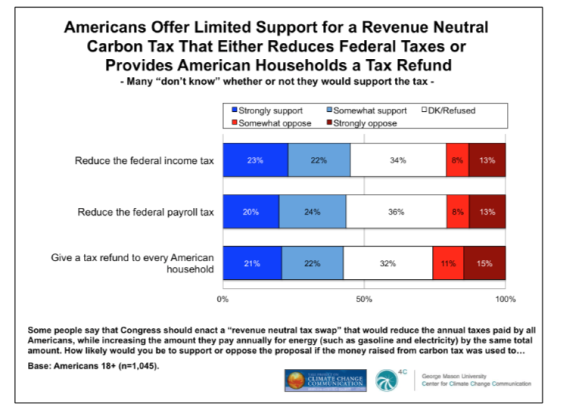Today Yale and George Mason are releasing the third report from their latest national survey, Public Support for Climate and Energy Policies in April 2013.
The takeaways? Well, for starters, big, fat majorities of voters want Congress and the president to get to work on American clean energy and climate solutions. Americans are increasingly looking to corporations and industry to take responsibility and do something about global warming (to lesser degrees they look to Congress, themselves, and the president to get to work).
A majority—61 percent—supports a carbon tax that would help pay down the national debt. But, as is typical, opposition to a carbon tax gains a majority (58 percent) when the specific cost to households is presented (in this case $180). Still, a large majority of Americans say they support a US effort to reduce global warming, even if it has economic costs.
Happily, those who continue to favor doing nothing are seeing their numbers dwindle.
The numbers are strong; there are no big adjustments to speak of one way or another. But recent fluctuations—or trends—aren’t necessarily continuing in the right direction. For example, American priorities for clean energy and global warming action by the president and Congress have decreased slightly as has support for several climate and energy policies.
Here are the highlights in more detail:
- A large majority of Americans (87 percent, down 5 percentage points since Fall 2012) say the president and Congress should make developing sources of clean energy a “very high” (26 percent), “high” (32 percent), or medium priority (28 percent). Few say it should be a low priority (12 percent).
- Most Americans (70 percent, down 7 points since Fall 2012) say global warming should be a “very high” (16 percent), “high” (26 percent), or “medium priority” (29 percent) for the president and Congress. Three in ten (28 percent) say it should be a low priority.
- Six in ten Americans (59 percent) say the US should reduce its own greenhouse gas emissions regardless of what other countries do. Relatively few (10 percent) say the US should reduce its emissions only if other industrialized and/or developing countries do—and only 6 percent of Americans say the US should not reduce its greenhouse gas emissions.
- Americans say that corporations and industry (70 percent), citizens themselves (63 percent), the US Congress (57 percent), and the president (52 percent) should be doing more to address global warming. These numbers have held steady over the past few years.
-
A majority—55 percent—of Americans support setting strict CO2 emission limits on existing coal-fired power plants to reduce global warming and improve public health, even if the cost of electricity to consumers and companies would likely increase by $100.
-
Majorities of Americans support: Providing tax rebates for people who purchase energy-efficient vehicles or solar panels (71 percent—high, but down 15 points since 2008); funding more research into renewable energy sources (70 percent—a solid number, but down 21 percentage points from 2008); regulating CO2 as a pollutant (68 percent); requiring fossil fuel companies to pay a carbon tax and using the money to pay down the national debt (61 percent, 20 percent strongly); eliminating all subsidies for the fossil-fuel industry (59 percent); requiring electric utilities to produce at least 20 percent of their electricity from renewable energy sources, even if it costs the average household an extra $100 a year (55 percent).
- While a carbon tax with revenue going toward reducing the national debt gets majority support, Americans still don’t buy the idea of a tax swap or rebate. Carbon tax support drops for proposals that would reduce the federal income tax (45 percent support); reduce the payroll tax (44 percent support); or give a tax refund to every American household (43 percent). However, many Americans—around a third—simply say they don’t know if they would support or oppose such proposals.

- Majorities of Americans oppose increasing gas taxes by 25 cents a gallon and returning the revenue by reducing the federal income tax (66 percent oppose, 36 percent strongly); the elimination of federal subsidies for the renewable energy industry (58 percent oppose, 21 percent strongly); requiring companies that produce or import fossil fuels to pay a carbon tax that could cost the average American household $180 a year (56 percent oppose, 24 percent strongly).
- A majority—58 percent—supports expanding offshore drilling for oil and natural gas off the US coast. However, support for drilling is down 7 points from 2008.
- Surprisingly, half of Americans (50 percent) have never heard of the Keystone XL pipeline. Only 18 percent say they are following the issue closely. And among those Americans who have heard of the Keystone pipeline, about two in three support the project (63 percent).

